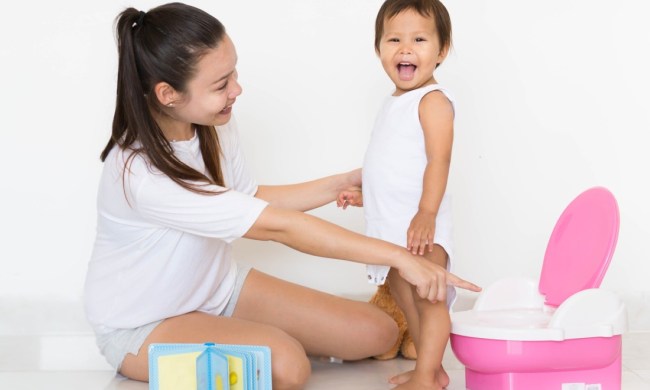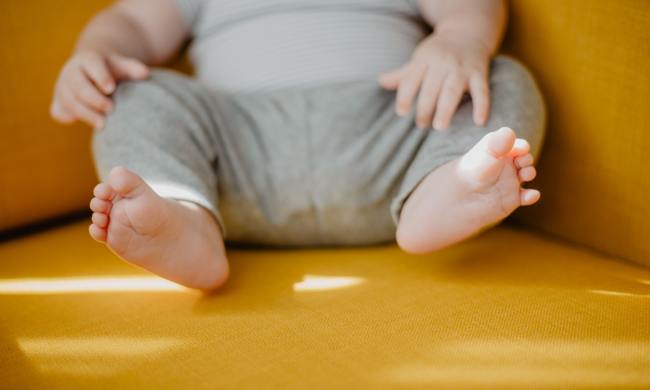Fireworks can be spectacular. They light up the sky and look absolutely magical. Summer is full of sizzling, sparkling, crackling firework displays — and we can’t wait to kick off all the seasonal celebrations. Of course, while you might be excited for the boom, bang, and bling, your kiddos might be, well, less than enthused (cue the tears!).
Fireworks can be scary for toddlers — they are loud, they are sudden, and they are not a part of the normal, calming evening routine your sweetheart is used to.
The thing is: Some kids won’t be remotely bothered by them, while others will be sent to instant-meltdown mode. So, whether you are celebrating the start of summer at a beach soiree or marking Independence Day at a community show with your little ones in tow, mind these eight tips about how to calm a toddler during fireworks. You know — just in case.

Talk about the event beforehand
Is your toddler scared of fireworks? If you are attending an event that will have a display, talk about it with your child beforehand. It’s important that you don’t purposely avoid this warning; instead, give a heartfelt heads-up. Explain to your wee one that, while fireworks sound loud, they look beautiful. It’s just meaningless noise — you are far away, and there’s nothing that can hurt or harm you.
Have a comfy spot at the ready
You’ll want to make sure that you have a comfortable spot for snuggling up should nerves set in. If you’re watching fireworks from a park or beach, have plenty of blankets and chairs so that your little one can remain comfortable — and so that you can hold your love bug should they need extra mama or daddy cuddles.
You know what else never hurts? Snacks! This is a celebratory event, after all — and even if it seems a bit nerve-racking, how bad can it be when there are cupcakes and cookies involved?
It’s also wise to choose a social setting; having other families present can make it seem less intimidating. If other children are enjoying themselves, your little one might realize that they, too, can have a good time.
Bring earmuffs or noise-canceling headphones
If your child’s fears are not abated by communication — or if they have had a hard time with loud noises in the past — you might consider investing in a pair of kid-sized noise-canceling headphones or earmuffs. These will mute the volume of a fireworks show and protect sensitive ears.
Do not gloss over your toddler’s concerns
It’s easy to laugh off your little one’s concerns about loud fireworks or make dismissive comments — “It’s nothing; it’s just a boom!” But that doesn’t really help address your child’s concerns or quell their fears in the moment. Instead, acknowledge and redirect: “I know it’s loud, but look at that beautiful glittery color!”

Count the big booms (and make it a game!)
You can make a game out of counting the booms. This simple distracting tactic can give kids something else to focus on — instead of their fear. It will also help them find rhythm in the fireworks and the noise, so they can predict a sound pattern.
Another option? Have them sing loudly over the fireworks — join in with them! Again, the idea is to give them something else to think about.
Bring a blanket and a stuffed animal
If your toddler has a creature comfort — like a stuffed animal, blanket patch, or — dare we say — a binky, have them take these items to the fireworks show. They might feel better cuddling up with their beloved teddy. Children with sensory issues might also be comforted by the gentle pressure of a weighted blanket.
Use a sound machine
Fireworks are amazing if you are watching them live. But if you are just hearing them at your home, past your toddler’s bedtime — well, that is a whole different and annoying story. If the noise level is keeping your cutie-pie awake and scared, try turning on a sound machine. White noise can drown out the sporadic but alarming cracks of fireworks. (Hopefully, you don’t also have a howling dog.)
Be willing to compromise your plans
You might have to accept that a grand fireworks show just isn’t in the cards for your family right now. If you have a baby, you might want to skip this event altogether. You can certainly try rationalizing with a toddler, but you already know that communication, while important, can yield mixed results. Littles are fickle like that.
Be willing to pull the veritable plug on your fireworks plans should you need to — retreat to the car with your toddler and move on — or hire a babysitter to stay home with your mini. As a parent, you need to pick your battles; decide how important this one is for you.
Baby, you’re a firework! And once that popping starts, your little firecracker may start screaming. Watching fireworks doesn’t mean you also have to watch your toddler bug out. You can try to get them to warm up the sights and sounds of these festive summer light shows. And if that’s a hard no? Well, they can stay home with your terrified dog. Good times!


